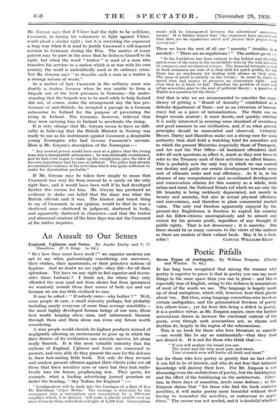An Assault to Our Senses
England, Ugliness and Noise. By Ainslie Darby and C. C. Hamilton. (P. S. King. is. 6d.) "BUT how they must have smell 1" we superior moderns are apt to say when patronizingly considering our ancestors, their clothes, their apartments, or their primitive notions of hygiene. And no doubt we are right—they did—for all their splendour. Yet have we any right to feel superior and to con- Bider them barbaric ? I think not, for where they only offended the nose (and not from choice but from ignorance) we wantonly assault those finer senses of both eye and ear because we are too little civilized to care.
It may be asked : "If nobody cares—why bother ? " Well, some people do care, a small minority perhaps, but probably including nearly everyone of more than average sensibility— the most highly developed human beings of our race, those best worth keeping alive; sane, and unharassed, because through them and them alone can come any future worth considering.
A wise people would cherish its highest products instead of negligently allowing an environment to grow up in which the finer flowers of its civilization can scarcely survive, let alone really flourish. It is this most valuable minority that the authors of England. Ugliness and Noise are concerned to protect, and very ably do they present the ease for the defence in their hair-raising little book. Not only do they recount and analyse present offences against their clients (who are all those that have sensitive eyes or ears) but they look realis- tically into the future, prophesying woe. They quote, for example, what a leading advertising journal promises us under the heading, "Sky Talkies for England" :—
"
Loudspeakers will be built into the fuselages of a fleet of five De Havilland 'Gipsy Moths.' The message is delivered by the announcer into a microphone and transmitted by a 260-watt amplifier which, It is claimed, 'will make it plainly audible over an area of two to three miles from a height of 1,500 feet. Gramophone music will be interspersed between the advertisers' announce. ments.' It is further stated that 'the organisers have ascertained that there are no regulations which will prevent their project bellig
carried out" .
There we have the root of all our " amenity " troubles in a nutshell : "There are no regulations " The authors go on :— "So far, legislation has been content to lag behind and shoddily patch some of the rents in the social fabrie torn by the wild advance of commerce and mechanical science. The financial interests vested in fresh nuisances are sure of a clear field for quick profits, for the State has no machinery for dealing with abuses as they arise. The onus of proof is entirely on the victim : he must be ready to spend time and money to preserve an elementary right : and even then he is likely to fail. Therefore the problem of rural and urban amenities goes to the root of political theory; a question of Rights is a question for the State."
And that is why we are recommended to consider the expe- diency of getting a "Board of Amenity" established as a definite department of State—not as an extension of bureau- cracy but as a piece of rationalization. The State can no longer remain neutral ; it must decide, and quickly, whether it is really interested in securing some standard of seemliness and good manners in our civilization, and, if so, what general principles should be enunciated and observed. Certainly Messrs. Darby and Hamilton make out a strong case for some authority that shall hold a watching brief for amenities and to which the present Ministries (especially those of Transport, and Air and the War Office—all hardened offenders) shall refer all such questions as affect it, much as they now have to refer to the Treasury such of their activities as affect finance. This is probably now the only way in which we can control our destiny and guide our erratic development towards sonic sort of ultimate order and real efficiency. As it is, in the absence of any comprehensive and co-ordinated development and conservation scheme for this country as a whole, both urban and rural, the National Estate (of which we are only the life tenants) is being recklessly depreciated, not merely in beauty and amenity, but also in actual physical efficiency and convenience, and therefore in plain commercial market value. The only real freedom apparently enjoyed by the present-day Englishman is freedom to exploit his country and his fellow-citizens unscrupulously and to almost any extent for his private profit, regardless of any thought of public rights. That is not democracy ; it is anarchy. But there should be as many converts to the views of the authors as there are readers of their valiant book. May it be a best-










































 Previous page
Previous page